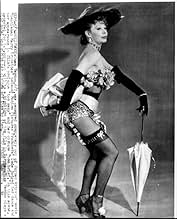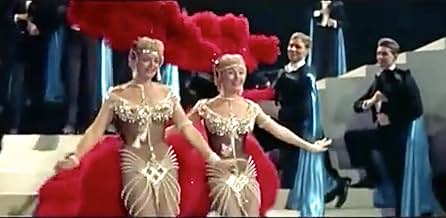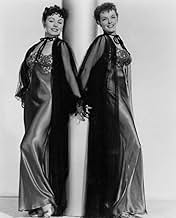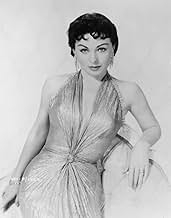Dos coristas de Broadway, que además son hermanas, están hartas de Nueva York y de no llegar a ninguna parte. Renunciando a Broadway, las hermanas deciden viajar a París para hacerse famosas... Leer todoDos coristas de Broadway, que además son hermanas, están hartas de Nueva York y de no llegar a ninguna parte. Renunciando a Broadway, las hermanas deciden viajar a París para hacerse famosas.Dos coristas de Broadway, que además son hermanas, están hartas de Nueva York y de no llegar a ninguna parte. Renunciando a Broadway, las hermanas deciden viajar a París para hacerse famosas.
Howard Tracy
- Chauffeur
- (as Edward Tracy)
Carmen Cabeen
- Blonde
- (as Carmen Nesbitt)
- Dirección
- Guionistas
- Todo el elenco y el equipo
- Producción, taquilla y más en IMDbPro
Argumento
¿Sabías que…?
- TriviaFox studio head Darryl F. Zanuck had originally assumed the need to dub the singing voices of Jane Russell and Marilyn Monroe in Gentlemen Prefer Blondes (1953) until musical director Lionel Newman famously stitched together a vocal rendition of their opening number from multiple takes. As a back-up plan, an alternate set of recordings was made with Eileen Wilson dubbing Russell's voice, but in the end both ladies sang for themselves, and Russell even released an album of songs on the MGM label. From that point on, Jane Russell always sang in her own movies, including Gentlemen Marry Brunettes (1955), and she would go on to a very successful run on Broadway as Elaine Stritch's replacement in the show "Company" in 1971.
- Citas
Connie Jones: Bad dreams? I'm having nightmares in CinemaScope!
- ConexionesFeatured in Legendy mirovogo kino: Jane Russell
- Bandas sonorasGentlemen Marry Brunettes
Music by Herbert W. Spencer and Earle Hagen
Lyrics by Richard Sale
Performed by Johnny Desmond
Opinión destacada
"Gentlemen Marry Brunettes" is sometimes regarded as a sequel to "Gentlemen Prefer Blondes" from two years before, but introduced a completely new set of characters. I have never read either of the Anita Loos novels on which the two films are based, but understand that her "But Gentlemen Marry Brunettes" was indeed a true sequel to its predecessor in that it follows the further adventures of Lorelei Lee and Dorothy Shaw. Neither of these characters appear in the film. The only things the two films share are a broadly similar plot and the presence of Jane Russell as one of the leads.
As in the earlier film, Russell plays an American showgirl, here named Bonnie Jones who performs as part of a double act with her sister Connie. The two sisters decide that their careers on Broadway are going nowhere and that they should try their luck in Paris. Once in the French capital they achieve greater success and fall in love with two young men. And that, more or less, is the plot, although there are also flashbacks featuring another pair of Jones sisters, Mimi and Mitzi (the mother and aunt of Bonnie and Connie) who were the toast of Paris in the twenties.
As in "Gentlemen Prefer Blondes" the emphasis is very much on the female stars; the two male leads, Alan Young and Scott Brady, are even more bland and anonymous than their opposite numbers in the first film. Russell's co-star in "Gentlemen Prefer Blondes" was, of course, the blonde Marilyn Monroe, and an important part of the storyline of that film was that their two characters had not only contrasting looks but also contrasting personalities. Monroe's Lorelei was a quite unashamed gold-digger and Russell's Dorothy, despite a string of cynical wisecracks, was the idealistic "good girl".
Here, Russell is teamed with another brunette, Jeanne Crain. The visual contrast from the earlier film is lost as the two women were similar in looks, although Crain was slightly shorter and less voluptuous. There is an attempt to give their characters different personalities, Bonnie being more flighty and impulsive and Connie more level-headed, but these differences are never brought out well either by the script or by the acting. Russell is not as good here as she was in "Gentlemen Prefer Blondes"; Dorothy seems to have been a character much more suited to her style of acting than is Bonnie. Perhaps, also, after "Blondes" and "The French Line", she was getting fed up with being typecast in scantily-clad showgirl-type roles. As for Crain, she is, quite frankly, a poor substitute for Marilyn.
The film contains some famous songs, although many of these such as "My Funny Valentine" and "Ain't Misbehavin'" have been appropriated (some would say misappropriated) from other contexts. The latter song here suffers from being performed in the context of a bizarre sketch in which Russell and Crain are chased by spear-wielding African cannibal tribesmen and end up in an enormous cooking-pot, a sequence which today seems almost hilariously politically incorrect. Even in the fifties it probably seemed rather off-colour to anyone more sensitive than the average Hollywood film-maker; political correctness is not always a bad thing. The Mimi/Mitzi scenes also get a bit annoying. There is a running joke that the older Jones sisters achieved their immense success despite a total lack of talent, and this is the sort of running joke that quickly outstays its welcome.
As a musical, "Gentlemen Marry Brunettes" contains some attractive music, but its mediocre acting, unmemorable dialogue and virtually non-existent plot means that, as a film, it is in nothing like the same class as its more illustrious predecessor. 5/10, mostly for the music.
As in the earlier film, Russell plays an American showgirl, here named Bonnie Jones who performs as part of a double act with her sister Connie. The two sisters decide that their careers on Broadway are going nowhere and that they should try their luck in Paris. Once in the French capital they achieve greater success and fall in love with two young men. And that, more or less, is the plot, although there are also flashbacks featuring another pair of Jones sisters, Mimi and Mitzi (the mother and aunt of Bonnie and Connie) who were the toast of Paris in the twenties.
As in "Gentlemen Prefer Blondes" the emphasis is very much on the female stars; the two male leads, Alan Young and Scott Brady, are even more bland and anonymous than their opposite numbers in the first film. Russell's co-star in "Gentlemen Prefer Blondes" was, of course, the blonde Marilyn Monroe, and an important part of the storyline of that film was that their two characters had not only contrasting looks but also contrasting personalities. Monroe's Lorelei was a quite unashamed gold-digger and Russell's Dorothy, despite a string of cynical wisecracks, was the idealistic "good girl".
Here, Russell is teamed with another brunette, Jeanne Crain. The visual contrast from the earlier film is lost as the two women were similar in looks, although Crain was slightly shorter and less voluptuous. There is an attempt to give their characters different personalities, Bonnie being more flighty and impulsive and Connie more level-headed, but these differences are never brought out well either by the script or by the acting. Russell is not as good here as she was in "Gentlemen Prefer Blondes"; Dorothy seems to have been a character much more suited to her style of acting than is Bonnie. Perhaps, also, after "Blondes" and "The French Line", she was getting fed up with being typecast in scantily-clad showgirl-type roles. As for Crain, she is, quite frankly, a poor substitute for Marilyn.
The film contains some famous songs, although many of these such as "My Funny Valentine" and "Ain't Misbehavin'" have been appropriated (some would say misappropriated) from other contexts. The latter song here suffers from being performed in the context of a bizarre sketch in which Russell and Crain are chased by spear-wielding African cannibal tribesmen and end up in an enormous cooking-pot, a sequence which today seems almost hilariously politically incorrect. Even in the fifties it probably seemed rather off-colour to anyone more sensitive than the average Hollywood film-maker; political correctness is not always a bad thing. The Mimi/Mitzi scenes also get a bit annoying. There is a running joke that the older Jones sisters achieved their immense success despite a total lack of talent, and this is the sort of running joke that quickly outstays its welcome.
As a musical, "Gentlemen Marry Brunettes" contains some attractive music, but its mediocre acting, unmemorable dialogue and virtually non-existent plot means that, as a film, it is in nothing like the same class as its more illustrious predecessor. 5/10, mostly for the music.
- JamesHitchcock
- 26 ene 2010
- Enlace permanente
Selecciones populares
Inicia sesión para calificar y agrega a la lista de videos para obtener recomendaciones personalizadas
- How long is Gentlemen Marry Brunettes?Con tecnología de Alexa
Detalles
- Tiempo de ejecución1 hora 39 minutos
- Relación de aspecto
- 2.55 : 1
Contribuir a esta página
Sugiere una edición o agrega el contenido que falta

Principales brechas de datos
By what name was Gentlemen Marry Brunettes (1955) officially released in India in English?
Responda



















